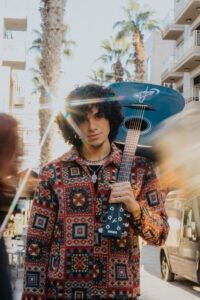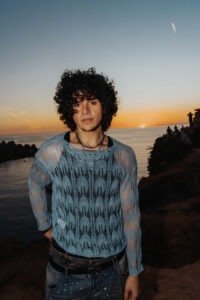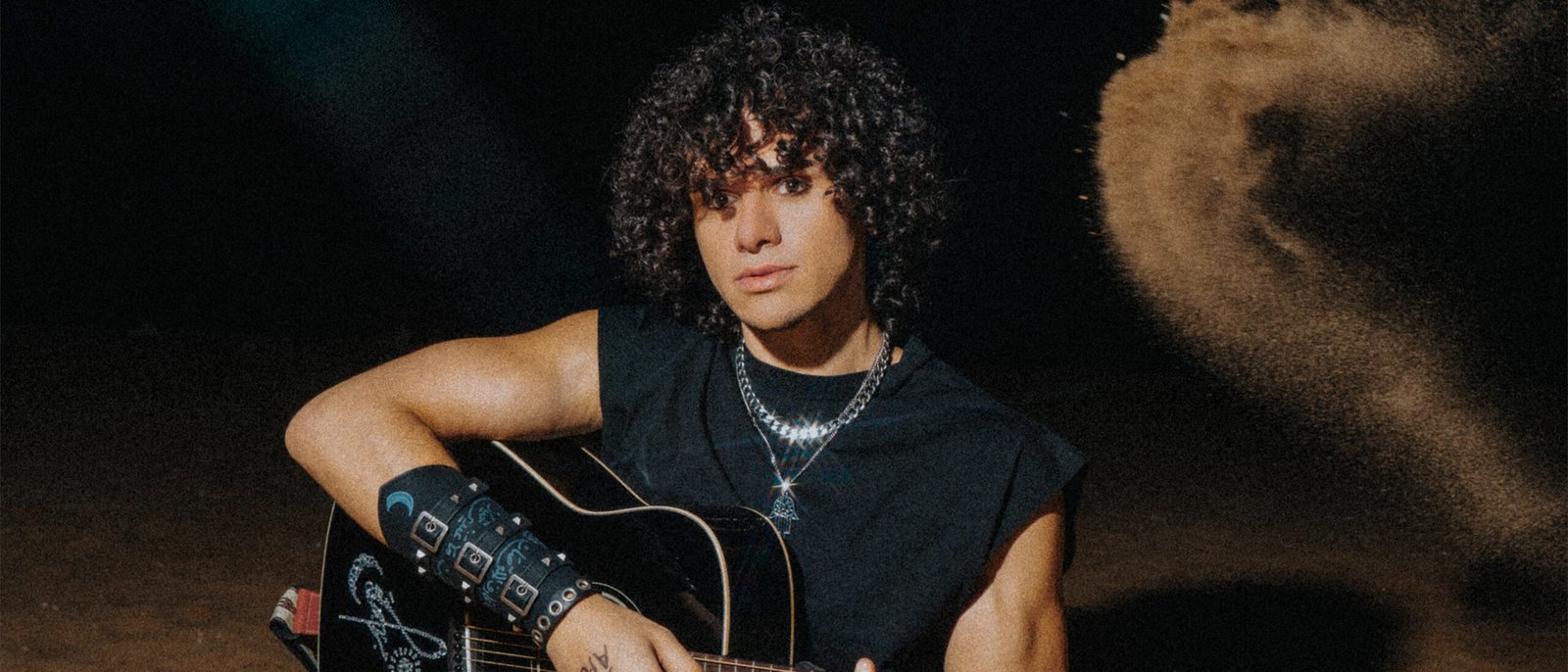It’s been a long year without him but A-pop trailblazer Bahjat is back with his latest single, “Loco”. After going from the top of his game on social media to being ridiculed by the masses for his creative expression, Bahjat is ready to reintroduce himself and his music to a fandom that never left him behind and a whole new world of listeners looking for something fresh and new. We spoke with Bahjat about this past year, how it’s inspired his latest material and what’s on the horizon.
Atlas Artist Group: You’ve had quite a year. Let’s talk about that- what went on, what happened, and how has that affected you as a creative leading into your new music?
Bahjat: Yeah, it was such a strange experience, I would say, because back in 2022 I went really viral on Tik Tok and I was gaining like 50,000 followers a week and it was this insane momentum. And then my brain kind of…I don’t want to say got trained, but I became so addicted to going on the comments because it was so much love. So you go and you’re like, oh my god, people love me. It’s so much affection- 17,000 people a night show up to my live streams, like doing crazy numbers. And then you start getting attached to that level of love and affection but naturally, as an artist, you want to keep exploring your music. So I kept on exploring the music, like the lyrics, the vulnerability aspects of everything being more me.
One of the things I really liked to experiment on was the fashion. I loved weird sparkly glasses and I loved weird sequin jackets. I noticed that when I started to do that, the tides had turned against me from people back home who thought that it was too feminine or too out there for an Arab Libyan man to do. That obsession with checking the comments became my biggest enemy, because now it’s not love. It peaked at a moment in 2024 where it was over 2,000 comments a day just wishing that I was dead, just wishing the absolute worst. To go from building my dopamine system from seeing the love on the comments to facing it like this, it was such a strange experience. It all catapulted when I wrote this super vulnerable song to me about my dad and how he exited the picture in our lives, and they made me the villain out of that. They said you should never talk about your parents under a bad light no matter what happens, taking away my right to talk about my experience.
After that, all of that happened, I just was like, what am I writing for right now? When you spend so much time on social media, you’re chasing numbers and chasing trends and you start to write in the formula that works for social media platforms, but then it’s not like the legacy type of music. It’s more of ‘here’s what’s going to go viral today’ and then that’s it. I decided I just need to take a bit of a step back. I need to go back to the Bahjat that wrote because I needed to say something. So I went away from social media- this is my first release in over a year. It’s been a while, so I took a step back and I was like, what do I stand for? What do I want to talk about? What matters to me beyond the whole social media hype? You start to put on this persona that people got used to and somewhere along the line, you lose the real scope.
Even though I was doing well, it’s not anywhere close to where I want to be. I got too invested in and I lost track of the vision that I had before this happened. I went back to the drawing board and I started writing music like I was 15 again. I was like this situation really affected me- I’m going to write a song about that. I’m going to write a song about my weight loss journey that happened a few years ago which I never really talked about in my music. I’m going to write a song about this feeling I’ve had since I was a child. In Libya, I was a bit too…I like Disney Channel and Hannah Montana and these were not very Libyan things to like, so I was constantly the outsider. Then I moved to Malta and I was never Maltese enough because I still have that heritage. I’m [too] feminine for the men, but I’m also not feminine enough for the other side. It always felt like I existed in this weird center where I did not really blend into anything and wherever I looked in my life, I just saw it everywhere. I’m making Arabic and English music.
The record labels are like, you have to choose but I can’t choose. This is literally everything that I do in my life is centered around this awkward middle where it’s the middle you’re supposed to be in before you make a choice. I exist in that middle in everything I do in my life. So with this upcoming music and this upcoming debut album, I actually just embrace being in that middle and that’s probably the path that I need to be on. I’m not going to try to bend a bit to the left and a foot to the right and try to be everything at once, because it doesn’t come naturally to me.
Atlas: You touched on this, but you seem to be running into some cultural barriers in a lot of different ways. How does that inform your music? Are you throwing caution to the wind or has that been more of a barrier when you’re trying to write music and express yourself? Does that blocker show up in your brain and you have to push past it?
Bahjat: That’s a really good question, because I feel like it’s so much of what I’ve gone through creatively. I think what’s really fun about the music I’m making now is I look at myself as my own person first. It’s easy to get lost in the boxes of what you should be culturally, especially in places where self expression is still- I don’t want to say a new concept, because so many people have done it. But on such a mainstream level, I would say- at least where I’m from- there haven’t been that many people outside of the box in terms of celebrities or pop stars or actors. The general public has this box, this image of what you should be if you’re going to be a public figure. The reality is, when you look throughout history, the artists who have made the normal culture of today were pushing the culture at the time they were happening.
With this record, I’m going at it with no matter what I do, what I’m living right now is my own culture. I come from Libya. I’ve lived in Europe. I’ve lived in Malta, in Stockholm. I have friends from everywhere around the world. That newness to it does not diminish the cultural aspect of it, because it’s still a real experience. It’s like my lived experience so I’m going at it with, I’m gonna figure me out and then just see how people perceive it. I think if you try to create with that thought of I need to fit into this cultural box, then it’s just going to be that. For me, art has always been about your self expression and then people will interpret it the way they want to. They’re going to think it’s too Western or too Arabic or too out there, but I’m really putting a conscious effort into just being me and doing the stuff that I like. I can’t explain it in a logical way, but there is nothing else that I can be doing right now. It’s such a strong belief that this is my destiny that I know that I just need to walk this and just see where it takes me because I cannot see myself doing anything else in life.
 Atlas: Let’s talk about the new single, “Loco”. What was the creative process for this song? How did you decide who you were going to work with on this one and then how did you figure out that this was going to be your comeback single?
Atlas: Let’s talk about the new single, “Loco”. What was the creative process for this song? How did you decide who you were going to work with on this one and then how did you figure out that this was going to be your comeback single?
Bahjat: “Loco” is a song that came to me sometime in 2024. I produce a lot of my own music now, which has been a really exciting development in my career, where I just get to sit down and geek around sounds and see what I like. I wrote this chorus in five minutes, and I was like, I’m probably gonna need to rewrite this, right? It just came so fast and then as time went by and I showed it to people, they’re like this is the catchiest song you’ve ever made. I was just vibing on the idea that I came up with. I lived with that chorus for a month or two and then I sat down and I was like, I know exactly what I want to do with the song. I wrote out the first verse and the second verse and built this idea of being crazy for someone, or crazy in love with a bit of my experience with my public life, which is this idea of a forbidden love. There’s so many layers in the metaphor of it’s a forbidden love. It’s like people are telling you you’re gonna go to hell if you continue with this love story, and you’re just like I’m gonna go for it, because hell is when I don’t have this.
When I finished the structure, I was thinking I would love to have someone go through it and maybe polish the production, add a few elements here and there. When I lived in Sweden, I attended this school called Musikmakarna and I remember there was this one producer- my friend Mark West- and I had always loved his work, but I never really got to work with him. I reached out to him and I’m like, I have these songs and I would love to discuss maybe doing a setup where I send you the things I’ve done and then see what you can add to it. He really liked that idea so I sent it to him. He had some of the really cool guitars that I was really dying to have. It’s a bit of a Mediterranean vibe and he mixed it. Then I discovered Jack Kennedy from one of my favorite upcoming artists, Adela. I loved one of her songs and when I saw who mastered it, I was like, I’m gonna keep track of this guy. When it came time to master the song, I reached out to Jack, and I’m like, do you feel like doing some A-pop music? It was one of those songs that happened really effortlessly and it felt like the right song to come back with because it picks up where I left off. It has this A-pop vibe, it has a Spanish title, two Arabic dialects mixed into it, English, Reggaeton. It feels like a celebration of cultures and love. It really felt like the right way to come back to releasing music.
Atlas: When you’re in the studio now, how has your approach to music itself changed for you over the years? Is it similar in any way to your past creative process or have you completely pivoted in your creative space?
Bahjat: I would say the biggest difference over the years is that I look at it now like it’s a craft a lot more than I used to when I was younger. When you’re younger, you’re really in it emotionally. But when you do it for years like I have now, it becomes a craft- every vocal take you become a bit more conscious. I still try to be that child when I’m making the music, when I’m writing it. You need to feel that sense of oh, this is cool, I like this, this is fun. It’s like different hats you put on. I make the idea and then I put my other hat on- is this melody the most interesting it could be? How is my vocal delivery here? Does it convey the right emotion? Maybe I can try experimenting with how I sound. If you hear some of my songs, my vocal delivery has really changed since a couple of years ago, and it’s a very conscious decision of trying to find my voice. I watched this documentary about the Bee Gees and they were talking about how the high pitched voice was such a recent development in terms of their career but it ended up being the thing that broke them through.
I just get inspired to never feel that I figured it out. That’s my biggest fear creatively- I never want to feel that. It needs to feel like a challenge every single time, or else, for me, it feels like I got too comfortable. I would say the biggest difference is the craftsmanship of it. At the same time, not so much as I was three years ago, where I was going by methodology. Now I’m trying to teach myself to be that child, that teenager that needs to write. As an adult, you learn to do that with a lot of different aspects of life where you do things in moderation. Your logical voice makes room for your creative, crazy voice.
Atlas: You mentioned that you’ve got an album coming out- any spoilers you can share?
Bahjat: I can share that the album is going to come out next year- hopefully before summer 2026. I think what I can say about this album is that this is the culmination of everything I’ve wanted to say and do for my entire life. I’m using the oud instrument- which is a traditional Arabic instrument- in a power pop ballad that’s in English, and I’m using vocoders with darbuka and tablas and really embracing everything I’ve ever loved about Western pop music by people I love. Like Max Martin- he’s my favorite producer of all time, but at the same time the songs by Amr Diab and Nancy Ajram that I grew up listening to on the radio on the way to school. Taking all of these things that I loved growing up and being like, I’m gonna put this in the album that makes sense to me lyrically. I’m not trying to make a decision where if it wants to be a Nancy Ajam-inspired type of thing, then it has to be in that lyrically [or] thematically. I’m trying to just take the elements and create my own path with it.
On the album, I do talk about this weight loss journey and the body dysmorphia that happens when you lose 260 kilos. I talk about my dad’s reaction to the song coming out of mine and how he made it feel that I was the villain in the story. I also talk about this identity crisis that I’ve had since I was a child. I think the exciting part is that over the years, I’ve built a fandom that call themselves the Bahjatroops that have really, really embraced me and my story and my journey. I’m making this album as a thank you for accepting the authentic me and this is what the authentic me sounds like on an album project.
 Atlas: Are you planning any live shows or touring around the new music?
Atlas: Are you planning any live shows or touring around the new music?
Bahjat: I am not in the elaborate phase of planning but it’s definitely one of the goals for the coming year. I haven’t done many live performances with my original music, so I’m excited to see how that’s gonna work. For me, social media was my gigging in bars phase and I think it’s really important to do that today, but I’m excited to be able to tour this. I think having an album makes it easier to say I can tour this and I have a concept rather than just singles. So fingers crossed, I’ll be on the road in 2026 bringing A-pop to a city near you.
Atlas: Any last thoughts or sentiments you want to express?
Bahjat: I would love for people to be a part of this community, to check out the music, to see the visuals and just allow for this expression that I have to live with them and see if they relate to it. Music has always healed me so it gives me so much joy when I know that other people have connected with my words and my melodies and the songs. I would just like to invite people into this A-pop universe- I just want to heal myself and heal anyone who’s in this community with me because I feel like that’s what music has been for me and for a lot of people.
Stream “Loco”, out now!
Images courtesy of Bahjat
This interview has been edited for length and clarity.
